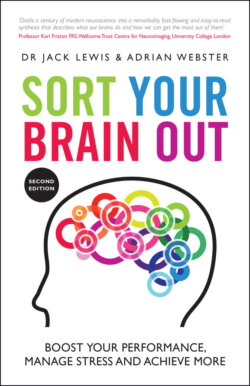Читать книгу Sort Your Brain Out - Джек Льюис, Адриан Вебстер - Страница 20
Working memory
ОглавлениеWorking memory is what you use to keep a phone number in your head for long enough to dial the number. You also use it any time you plan what you're going to do with your day or try to solve a problem. Sights, sounds and any other relevant pieces of information can be held in mind on the “Hold Line” (see Outward‐Facing Brain Tube map in the Appendix) for just long enough to perform a mental task effectively.
Experiments investigating brain training have found that certain exercises increase working memory capacity (e.g. the “Dual N‐Back” training task) and being able to simultaneously hold more information in mind supports many other useful cognitive capabilities. In fact, if we can improve our working memory, our IQ score will increase thanks to its positive impact on “fluid” intelligence.
As you improve at any skill, hobby or mental ability you are engaging in brain training. There is no evidence so far to suggest some kind of magic ingredient in the commercially available games – just convenience. The convenience might make a difference in helping you to keep going for long and hard enough to have a tangible impact in how your brain functions, in those games, at least. Sadly, any hard evidence that improvements in the games can translate into benefits in everyday life is suspiciously minimal. To gain the full benefits of “brain training” you'd probably be better off taking up a few new hobbies instead.
The key to doing enough mental work to actually make a physical difference to how your brain functions is finding “Flow.” Flow is a psychological phenomenon made famous by Mihaly Csikszentmihalyi (pronounced “six‐cent‐mihal‐i) with a specific meaning that has been bandied around so much it has lost most of its original simplicity.
The average capacity of working memory is seven items. By regularly practising to hold more items of information than that in your mind (e.g. phone numbers, shopping lists or credit card numbers) for long enough to do something useful with them, you can increase your working memory. That in turn leads to improvements in your problem‐solving abilities.
To remember what Flow is all about, just think about Goldilocks. She wanted her porridge to be “not too hot, not too cold, but just right.” Flow comes when you challenge your brain with some kind of absorbing mental task that is “not too hard, not too easy, but just right” – it keeps you keen to keep on going and creates a state of mind where time just seems to fly by.
If it's too easy for you, keeping your head down for a solid half an hour might be no problem, but your brain will only invest resources in changing its connectivity if it is pushed out of its comfort zone. If, on the other hand, the challenge is too hard, you might end up feeling stupid, convincing yourself that you're getting nowhere and that the task is futile. That's no good because you'll only end up feeling all frustrated, wound up and looking for something less productive to do instead.
This, incidentally, is something that some of the new brain training games tend to be very good at – successful computer game designers are masters of finding this sweet spot: where the gaming experience is challenging but without leading to despair. At the same time, they are also extremely adept at getting people addicted to their products, so bear that in mind too!
Whatever brain training you do choose to do, whether it's getting to grips with a new software package, memorizing some useful numbers or perhaps learning how to cook a new dish – it will change your brain most efficiently if you manage to find Flow. This is because Flow keeps you at it for long enough to trigger brain changes. Having found Flow you'll no doubt have also experienced enjoyment from the process and taken away some real satisfaction from your achievements, so you'll likely be greeting the prospect of doing it again with enthusiasm rather than dread. Finding Flow in the next challenge will be key to ensuring that your self‐propelling belief keeps you going in the right direction and that your brain continues to invest in whatever rewiring is required.
